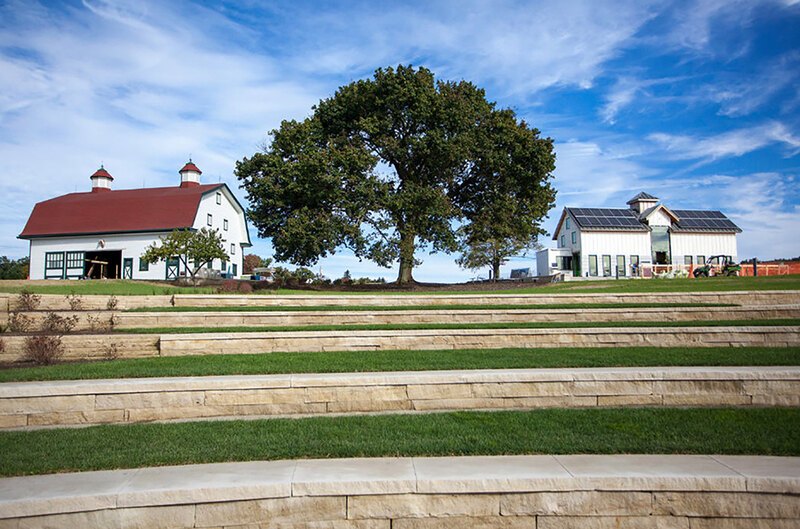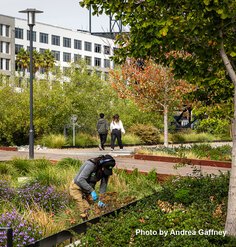From the Field: Advancing Healthy, Sustainable Living
By Amanda Wakefield, 2019 CSI Research Assistant, Michigan State University

Chatham University Eden Hall Campus is a 388-acre net-positive campus that is home to the Falk School of Sustainability. As a remote campus of Chatham University, Eden Hall includes a number of facilities, from classrooms, labs, and offices to residence halls and dining commons. Notable features of the development also include an amphitheater, “mosaic field” demonstration landscape, hoop house, and constructed wetlands for on-site wastewater treatment. According to the approved campus master plan, the campus will include four main areas. In 2016, the 31.5-acre first phase of the campus master plan, known as the Mueller Center Campus, was designed and implemented by Mithun. The design engages the “new farm” ideal, an inspiring landscape supporting health and wellness while advancing an important idea, that suburban land can be a net positive resource for urban areas. As a result of the campus’s mixed education and environmental programming, the sustainable features generate diverse benefits, reducing demand for residential water and energy, producing food, recycling nutrients, and supporting wildlife habitat.
When studying the unique features of the Eden Hall Campus, situated at the headwaters of the Ohio and Mississippi River watershed, one of the distinct innovations is the capture, treatment, and reuse of water on campus. Within the site, a constructed wetland treatment system provides superior wastewater treatment with effluent used for toilet flushing and irrigation. Rainwater is collected by the rainwater harvesting system at the campus for irrigation, and 24 onsite rain gardens manage surface stormwater while providing habitat for birds and pollinators. Between 2016 and 2018, some 843,380 gallons of water were captured by the campus rainwater management system and reused for irrigation.
While participating in the 2019 Case Study Investigation program, our research team learned how much it takes to truly account for landscape performance with various measurements. Through Mithun, our team was connected to John Cunningham, Director of Facilities and Building Systems for Chatham University Eden Hall Campus. John records daily data for the solar panels as well as potable water, rainwater, and wastewater treatment data and has done so since 2016. This comprehensive view of the sustainable features on campus not only helped to give insight into how the systems are being utilized, looking forward it also shows the potential for future benefits due to the fact that these systems will be even more efficient when the full phased development plan is implemented and there is more water running through the system.
CSI Team: Jun Hyun Kim, PhD, ASLA, & Amanda Catherine Wakefield
Project: Chatham University Eden Hall Campus, Richland Township, Pennsylvania
Landscape Architect: Mithun
This CSI Participant update was written in July 2019.
Any opinions expressed in this article belong solely to the author. Their inclusion in this article does not reflect endorsement by LAF.










